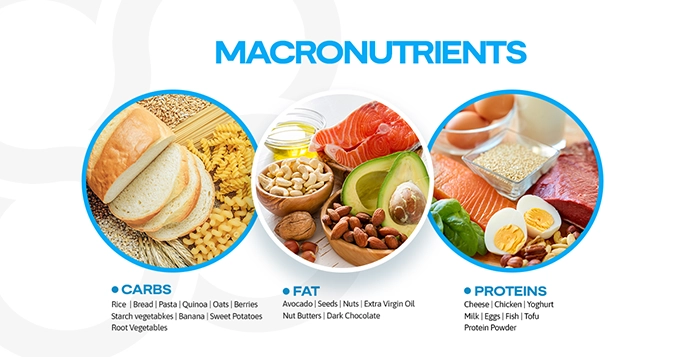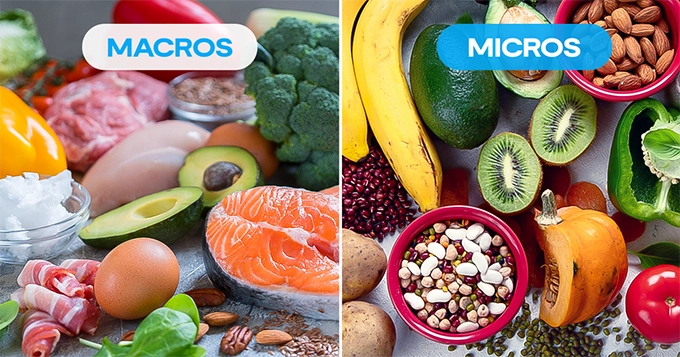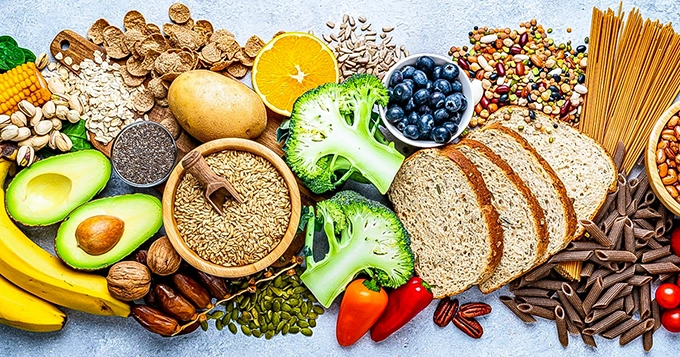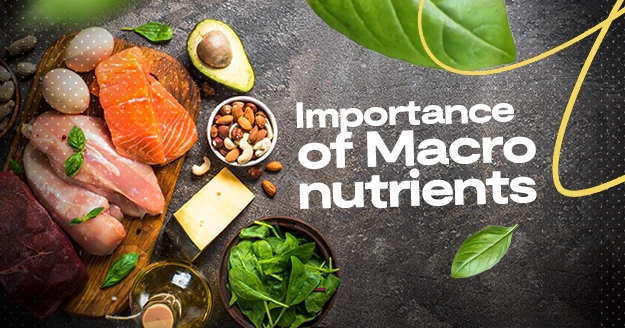What are macro nutrients?
Macronutrients are the types of nutrients that your body requires in large amounts on a daily basis to provide energy and maintain tissues and systems. There are three types of macro nutrients, namely: carbohydrates, protein, and fats.
Protein:
Proteins provide 4 calories per gram. Proteins are large, complex molecules that handle multiple important functions in the body. They are required for the structure, function, and regulation of the body’s tissues and organs and do the majority of the work in cells.
It’s recommended to consume high-protein foods along with the proper exercise if you want to have or maintain a muscular physique.
Fat:
Fat provides 9 calories per gram. It is the most calorie-rich macro nutrient. Fat allows you to store energy, cushion organs, produce certain hormones, absorb fat-soluble vitamins, and maintain the integrity of cell membranes.
Including healthy fats in your diet is good for lowering the risk of developing heart disease, improving blood cholesterol levels, helping with blood sugar control, and reducing inflammation.
Carbohydrates:
Carbohydrates provide 4 calories per gram. Carbohydrates, also known as carbs, are converted into glucose by your body. It is the primary energy source for your body’s cells, tissues, and organs.
Reduced carbohydrate consumption tends to suppress appetite and result in automatic weight loss. A low-carb diet allows some people to eat until they are full, and satiated, while still losing weight.
Micro vs Macro nutrients
We already talked about macronutrients and the three categories. Now, let’s explore what micronutrients are and how does it differ from macros.
Micro and macro nutrients are nutrients required by the body for survival, growth, and reproduction. Macronutrients are the nutrients the body requires in large amounts, while micro nutrients are those required in smaller amounts.
There are lots of micronutrients in the foods you eat, especially fruits and vegetables that are plentiful in vitamins and minerals. Micro nutrients include calcium, folate, iron, vitamin B-6, vitamin B-12, vitamin C, vitamin E, and zinc.
However, most people wouldn’t use a micronutrient approach to dieting because it would be difficult to measure and track.
How to Incorporate Macronutrients into Your Diet
The first step to incorporating each macronutrient into your diet is to set a calorie goal and a macronutrient range for carbs, protein, and fat that works best for you.
Then, keep a food diary where you log all the foods and drinks you consume. Try to stick to your macros by eating a diet high in fresh produce, healthy fats, complex carbs, and protein sources.
How much protein do you need?
The amount of protein you require is determined by your weight and the amount of exercise you get. It is recommended that your protein consumption should be 0.36 grams per pound of body weight. A sedentary man should consume at least 56 grams of protein per day. A sedentary woman should consume approximately 46 grams per day.
Some foods that are high in protein include:
- Meat
- Poultry
- Fish
- Eggs
- Dairy foods
- Seafood
- Low-fat milk
- Green peas
- Artichoke
- Sweet corn
How much fat do you need?
Fats should account for 20-35% of your daily calorie intake. If you are attempting to lose body fat, you should consume 0.5-1g/kg of fat per day to avoid essential fatty acid deficiency.
Some foods that are high in good fat include:
- Avocados
- Full-fat yogurt
- Fatty fish
- Nuts
- Chia seeds
- Canola oil
- Cheese
- Dark Chocolate
- Whole eggs
- Flax seeds
How much carbohydrates do you need?
Carbohydrates should account for 45–65% of your total daily calories. So, if your caloric goal is to consume 2,000 calories per day, your carbohydrate intake should be between 900 and 1,300 of those calories (225 to 325 grams of carbohydrates per day).
Some foods that are high in fiber include:
- Beans
- Broccoli
- Berries
- Avocados
- Popcorn
- Whole Grains
- Apples
- Dried Fruits
- Potatoes
- Nuts
Conclusion
Micro and macro nutrients are vital to healthy development, disease prevention, and well-being. But if your goal is to manage your weight, you might want to pay more attention to your macros. Macronutrients provide energy to the body, aid in disease prevention, and allow the body to function properly.
By ensuring that you hit your daily calorie goal and your daily macros, you are providing your body with the nutrients it needs to function every day and maintain a healthy physique.










